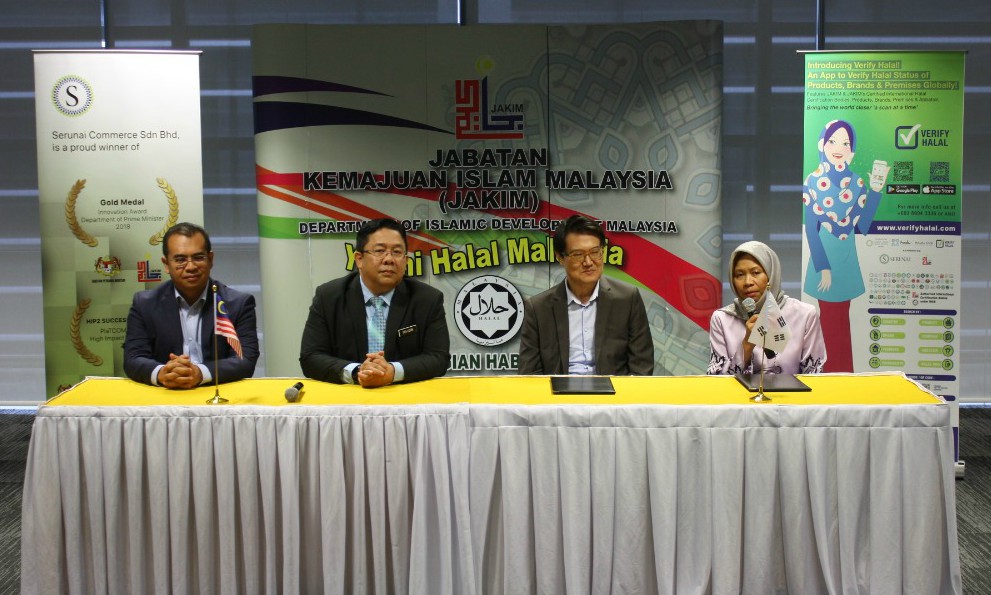
Korean halal promoter turns to Malaysian blockchain technology to boost exports
KUALA LUMPUR - A South Korean halal organisation will call on a platform developed by Malaysia’s Serunai Commerce to help promote companies in the country as they seek to export more to Muslim markets overseas.
Korea Institute of Halal Industry (KIHI), a promotion, research and testing business, on Thursday (October 31) signed an agreement with the specialist halal platform developer that will see Serunai integrate Korean manufacturers into its blockchain ledger which traces halal-certified companies around the world.
“KIHI expects to provide the Korean halal industry with opportunities to trade halal products and ingredients with global halal traders through Serunai’s platform,” said KIHI director general Dr. James Noh.
KIHI will promote Serunai’s service to these manufacturers and encourage them to use it as a means for their customers to trace their products along the supply chain. With traceability a fundamental element of halal certification, any element of a product’s process is recorded and cannot be altered.
Serunai has developed a suite of halal tools, including Global Halal Data Pool, which gives halal manufacturers direct access to buyers in nearly 50 international markets. Its Verify Halal app, meanwhile, allows users to instantly verify a product’s halal status. These integrate with the blockchain-powered HADIC, which connects a range of databases along the supply chain.
Amnah Shaari, Serunai’s founder and chief executive, explained that if a company has its own blockchain, it will remain behind its own private network.
“But the moment you track it on Serunai’s blockchain, we enable them to show the supply chain of their products in detail,” she added.
This enhances traceability of a bigger pool of halal products.
HALAL EXPORT POTENTIAL
With only around 180,000 Muslims out of a population of over 51 million, it is exporters who stand to benefit most from halal initiatives in Korea.
Speaking to Salaam Gateway on Thursday, Dr. Noh said he had been looking for ways to help halal-certified companies in Korea do better trade.
“They are looking for opportunities to sell their products. We will try to make these companies participate in this initiative. This will be a good opportunity for them,” Dr. Noh said.
Korea’s halal industry infrastructure saw substantial developments last year, to the point the country now has its first halal logistics service provider in the form of Sejoong Shipping, which has just been awarded a halal stamp from a local certification body and uses Serunai’s blockchain platform.
KFRI, the Korea Food Research Institute, a government-funded organisation, now also provides a testing laboratory to detect porcine DNA from food samples.
"These two developments have been very potent for the infrastructure of the Korean halal industry. Based on these, and there being more awareness of halal certification, we are seeing rapid growth of the halal industry in Korea,” said Dr. Noh.
The country now has more than 400 businesses with halal certification, around twice the number there were when KIHI was formed in 2014. This growth has been led largely by a number of government initiatives.
The Ministry of Agriculture, Fisheries and Rural Affairs in particular has been supporting companies to take this path, to the point it has been offering financial incentives that help cover the cost of certification, especially now it is essential for any foods that are exported to Indonesia, Noh said.
MUSLIM-FRIENDLY KOREA
Muslim-friendly tourism, too, has been high on the agenda, with the Korean government embarking on a strategy to increase on the nearly 1 million Muslim visitors to the country last year.
In May, KIHI signed an agreement in Seoul with Halal Industry Development Corporation, a government agency charged with promoting Malaysian certification, training and halal products, to provide its expertise in boosting Muslim-friendly hospitality in Korea.
“This is quite a big, untapped market. Muslims come here and are quite uncomfortable with the halal facilities we have, so we need more facilities and to invite more of the Korean tourism industry to provide their services to Muslim tourists,” said Noh.
He also revealed KIHI is preparing to become an accreditation body for Muslim-friendly facilities, which it expects to commence next year.
At the Putrajaya signing ceremony, Dr. Sirajuddin Suhaimee, director of the Halal Hub division of JAKIM, Malaysia’s Islamic Development Department, voiced hope that more organisations would turn to the country’s digital halal solutions.
“It will allow Malaysia’s halal industry to continue to develop and progress as a key player in the global halal marketplace. The potential for expansion and evolution of these systems is limitless,” said Dr. Sirajuddin.
(Reporting by Richard Whitehead; Editing by Emmy Abdul Alim emmy.abdulalim@salaamgateway.com)
© SalaamGateway.com 2019 All Rights Reserved
